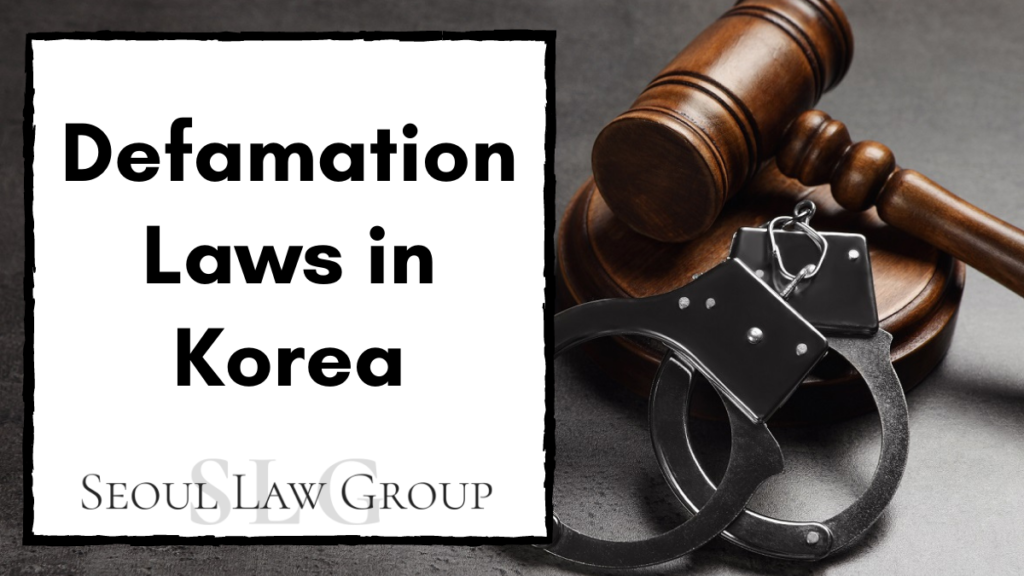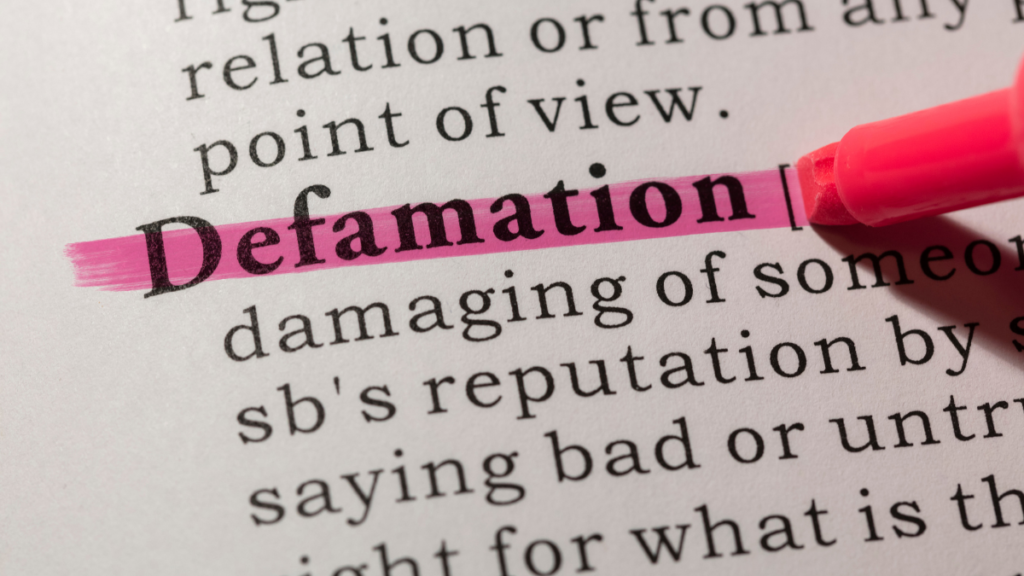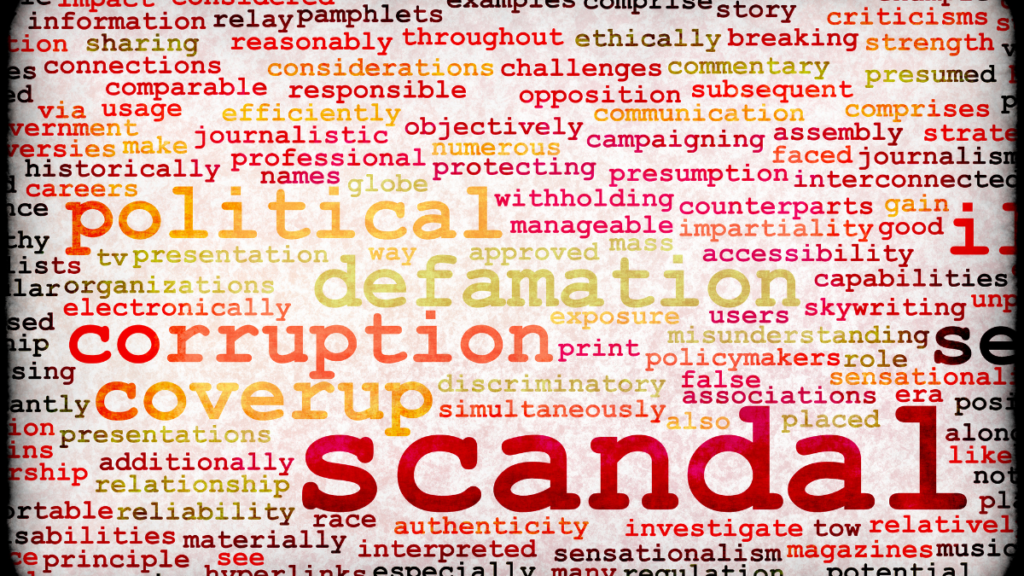Defamation Laws in Korea | Criminal, Civil & Cyber Korean Defamation Laws
Defamation or slander laws in South Korea are very different from those in other countries. Any words, even if it’s the truth, harming another can be considered illegal and may be punishable with fines or even imprisonment. In most Western countries, there is only civil liability for defamation whilst in Korea there is a civil liability and can be criminally punished. This article will give you a brief overview of what defamation laws in Korea entail, when to hire a criminal defense lawyer, and much more.

Table of Contents
Defamation Laws in Korea
Defamation in Korea refers to any reputational damage inflicted on a person, even if the statements are true. Defamation laws are not only limited to living people, but can also be about dead people. It is vital to know that being sued for defamation in Korea can lead to both civil and criminal liability. People charged for defamation can receive up to 7 years in prison or pay a fine. If you are non-Korean, this might lead to deportation.
The amount of defamation reports have increased over 40% since 2000 and so have the actual lawsuits and imprisonments. Defamation can be subdivided into criminal, civil, and the network act. Below you can see a breakdown of each one.
1. Defamation in Korea under the Criminal Act
-
-
- A person who defames another by publicly alleging facts shall be punished by imprisonment or imprisonment without prison labor for not more than two years or by a fine not exceeding five million won. <Amended by Act No. 5057, Dec. 29, 1995>
-
-
-
- A person who defames another by publicly alleging false facts shall be punished by imprisonment for not more than five years, suspension of qualifications for not more than ten years, or a fine not exceeding ten million won. <Amended by Act No. 5057, Dec. 29, 1995>
-
The article 307(1) refers to the defamation done by spreading a true story, while the article 307(2) refers to the defamation done by spreading a false story, which can be punished almost twice more severely than 307(1).
There are two requirements needed to be charged with defamation: one, the perpetrator must allege the facts (or false facts) which can hurt the victim’s reputation, and two, the allegation must be made “publicly.”
“Publicly” means that the perpetrator must tell the story to many people, or at least there must be a possibility that it would be spread to many people. For instance, if the perpetrator told their story to only one or two people, and those one or two people could be trusted to keep the secret (e. g. they were parents or spouse of the victim) then it can’t be defamation. But even if the perpetrator told their story to only one or two people, it can still be defamation if there was a possibility that those people would spread the story to many other people.
Article 308 (Defamation of Dead Person)
A person who defames a dead person by publicly alleging false facts shall be punished by imprisonment without prison labor for not more than two years or by a fine not exceeding five million won. <Amended by Act No. 5057, Dec. 29, 1995>
According to article 308, dead people can also be the victim of criminal defamation, but only when the alleged fact is false. For instance, there was a case where the perpetrator claimed that the victim only faked their death to run away from their debt, while the victim was really dead, and the court found the perpetrator guilty of “defamation of dead person.”
Article 309 (Defamation through Printed Materials)
-
-
- A person who commits the crime of Article 307 (1), by means of newspaper, magazine, radio, or other publication with intent to defame another, shall be punished by imprisonment or imprisonment without prison labor for not more than three years or by a fine not exceeding seven million won. <Amended by Act No. 5057, Dec. 29, 1995>
- A person who commits the crime of Article 307 (2), by the method described in paragraph (1), shall be punished by imprisonment for not more than seven years or suspension of qualifications for not more than ten years, or a fine not exceeding 15 million won. <Amended by Act No. 5057, Dec. 29, 1995>
-
Defamation through printed materials is basically the same with the normal defamation, except for two things: one, it is done by printed materials, such as newspaper, magazine, radio, book, etc., and two, it is done with special intention to defame the victim. This gets punished more severely than the normal defamation because of its method.
The “printed materials” doesn’t exactly need to be newspaper, magazine, radio, but it should be at least function like those published materials. For instance, if the perpetrator distributed a couple pages of paper handouts to the people on the road, it can’t be “defamation through printed materials.” In that case the perpetrator would be punished with normal defamation.
Article 310 (Justification)
If the facts alleged under Article 307 (1) are true and solely for the public interest, the act shall not be punishable.
According to article 310, there are two conditions to justify the defamation: one, the alleged story must be true, and two, the act was solely for the public interest.
However, according to the Supreme Court of Korea, the alleged fact doesn’t always have to be true; if the defendant believed it to be true, and there is a good reason to believe it, that would fall under Article 310. Also, it doesn’t have to be “solely” for the public interest, because according to the Supreme Court, even if the perpetrator has a personal reason (e. g. their personal grudge against the victim) to spread the story, their action can still be justified if their main reason was for the public interest.
For instance, there was a case where a male professor raped a female student, then the women’s right groups posted the rape incident on the internet in order to urge the school to punish the professor and prevent the recurrence of such incidents. The professor sued the women’s right group for defamation, but the court declared them innocent, because their alleged fact was true, and they did it for the public interest.
Article 312 (Complaint)
-
-
- The crimes of Articles 308 through 311 shall be prosecuted only upon complaint. <Amended by Act No. 5057, Dec. 29, 1995>
- The crimes of Articles 307 through 309 shall not be prosecuted over the express objection of the victim. <Amended by Act No. 5057, Dec. 29, 1995>
-
We looked over “chingojoe (친고죄)” and “banuisabulbeoljoe (반의사불벌죄)” in a previous article. Criminal defamation laws in Korea are a typical example of banuisabulbeoljoe in Korea. Even though a person defames another by publicly spreading facts or false facts, it cannot be prosecuted against the expressed objection of the victim.
Meanwhile, defamation of dead person is chingojoe. Even though a person defames a dead person by publicly spreading false facts, it cannot be prosecuted if the family or descendants of that dead person don’t complaint about it.
2. Defamation in Korea under the Civil Act
Victims can file a lawsuit and ask for damage compensation as defamation is related to social deterioration in terms of someone’s character, reputation, credit standing, personality and more.
That is why Korean Civil Act prepared a special rule for defamation. Usually, when a person causes damage to another person by an unlawful act, they should make compensation with money. But According to Article 764 of Civil Act, the court can order the person to take a “suitable measure” to repair the damage, aside from monetary compensation.
Article 764 (Special Rules Applicable to Defamation)
The court may, on the application of the injured party, order the person who has impaired another’s fame to take suitable measures to restore the injured party’s fame, either in lieu of, or together with damages.
3. Defamation in Korea Under the Network Act
“Act on Promotion of Information and Communications Network Utilization and Information Protection, etc.” or simply “Network Act” in short, stipulates the description and punishment of defamation happens on online (also known as Korean cyberbullying law).
One of the most frequent types of defamation is through social media and online networks. This includes writing bad reviews about products and services, leaving malicious comments to another person.
Article 44 (Protection of Rights in Information and Communications Networks)
-
-
- No user may circulate any information violative of other person’s rights, including invasion of privacy and defamation, through an information and communications network.
- Every provider of information and communications services shall make efforts to prevent any information under paragraph (1) from being circulated through the information and communications network operated and managed by the provider.
- The Korea Communications Commission may prepare a policy on technological development, education, public relations activities, and other activities to prevent violation of other persons’ rights by information circulated through information and communications networks, including invasion of privacy and defamation and may recommend providers of information and communications services to adopt the policy. <Amended by Act No. 11690, Mar. 23, 2013; Act No. 12681, May 28, 2014>
-
A huge majority of cyber defamation police reports come from online gaming incidents and of all the games, “League of Legends” is involved in almost half of the cases. Players being verbally abused by teammates or opponents often report to the police and there are even ‘settlement fee hunters’ who enter games with the intention of being insulted by other players. These players are mostly teenagers and their parents most often agree to a settlement instead (up to 2 million KRW) of having the case go to trial.

Defamation Defense Lawyer in Korea
If you are being sued for defamation, especially as a non-Korean, it is highly recommended to seek professional advice from an experienced defamation lawyer in Korea. Aaron Hwang from Seoul Law Group is a specialized criminal defence attorney certified by Korean Bar Association. The lawyers at Seoul Law Group speak fluent English and are highly experienced when it comes to criminal cases like defamation. They will be able to assist you in your case and receive the best possible outcome for you and your visa status.
Defamation Case Studies in Korea
Below is an overview of some criminal defamation cases which happened in South Korea in the past.
In 2020, the record label of the popular boys band BTS, won a defamation lawsuit against online internet trolls who have repeatedly posted malicious comments about the K-pop group. According to Big Hit Entertainment, one person who was sued for defamation on 3 separate occasions was charged with a fine of 4 million KRW.
In 2014, a Japanese news reporter was charged for defamation against the Korean president President Park Geun-hye. In one of his articles, he was insinuating that the president was absent during the Sewol Ferry disaster as she was with a man. This case was a significant example of how the president used this law to protect her image and of how the country is ruled by the South Korean government, not by the law. If the reporter was found guilty, he could have received up to 7 years in prison. Eventually, the case didn’t go to court and the Japanese journalist was acquitted of all defamation charges.
Controversy Regarding Defamation Laws in Korea
Many are opposed to the strict defamation laws in South Korea as it limits the freedom of speech and it is often used by people with power to limit public debate, stifle criticism and silence those with less influence. The Human Rights Committee, Human Rights Council and UN have expressed their concerns about the volume of defamation lawsuits in Korea and are pushing the Korean government to align the Korean laws in light with international laws regarding freedom of speech.

Frequently Asked Questions
Yes. Korean defamation laws don’t differentiate between the truth or not. Defamation in Korea refers to any reputational damage inflicted on a person.
The public is becoming more and more aware that if someone has gone through something which was unfair, the truth should be revealed. This movement has been pushing for a revision of the South Korean laws.

[…] Korea’s defamation laws allow individuals to be sued for posting malicious rumors or any words — even if they are true — that harm another person; punishment includes fines or […]
Thanks for your comment. If you require any assistance with your legal matters, please do not hesitate to reach out to us via email at info@seoullawgroup.com. We are here to assist you.
My friend left a 1 star review for a hostel that cancelled his stay last minute. They said they were reporting the review to the police. Should he be worried?
Thanks for your inquiry regarding your friend. If your friend requires any assistance with the legal matters, please do not hesitate to reach out to us via email at info@seoullawgroup.com.
Hi, I would like to know that how long will it take to start first trial for criminal & civil charges. When the police start investigate the case???
Thank you for contacting Seoul Law Group. Please EMAIL US at info@seoullawgroup.com with a description of your situation so that we may assist you. Thank you.